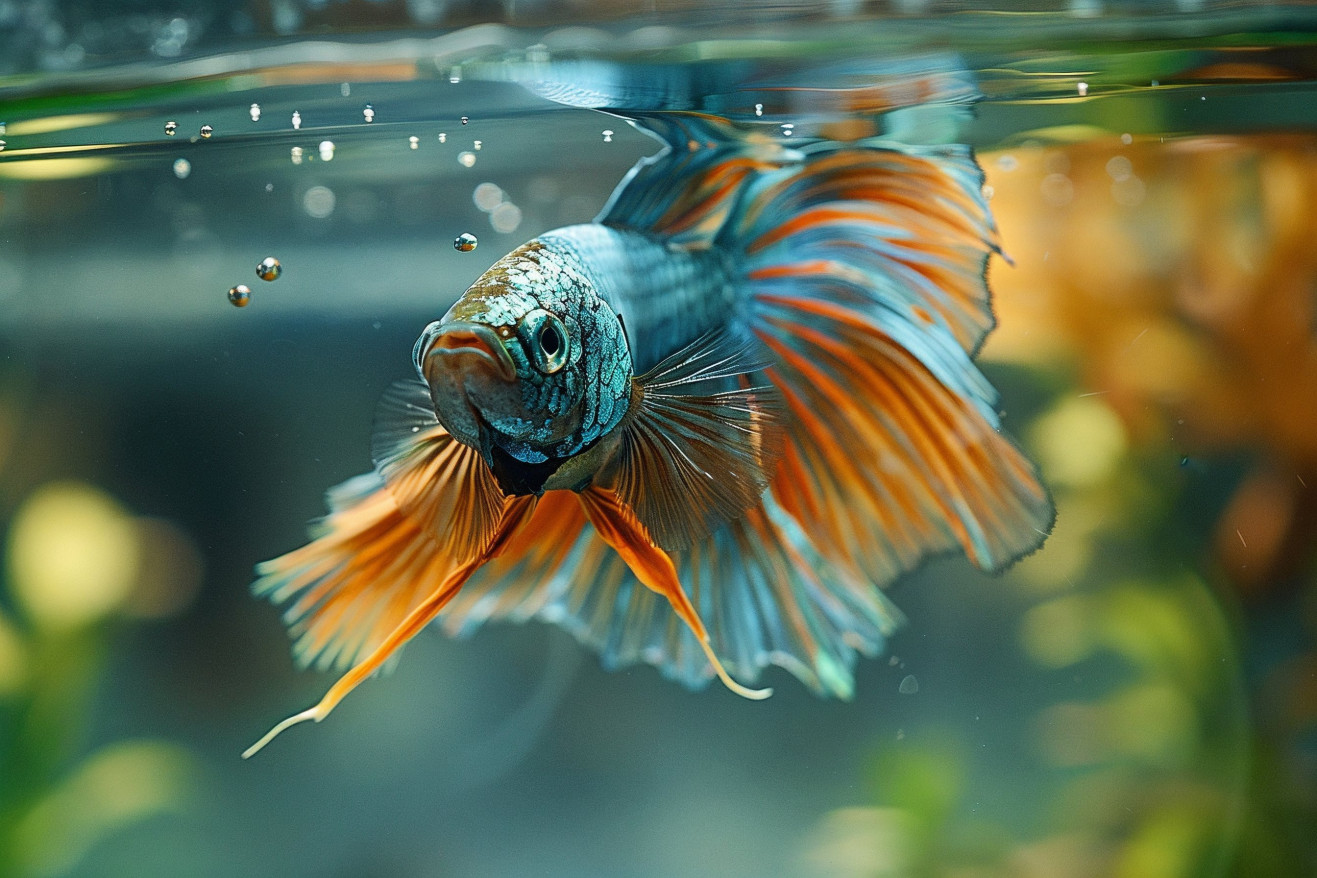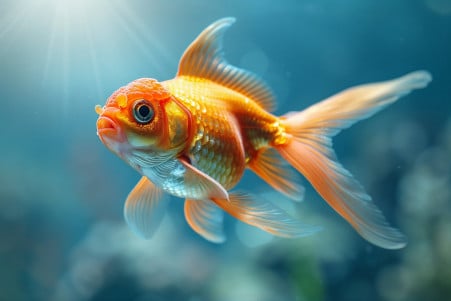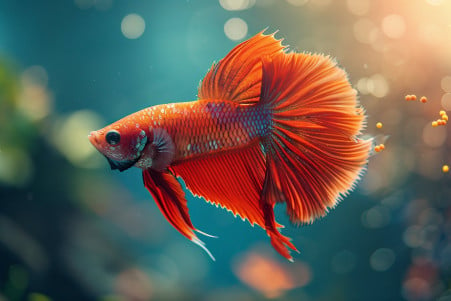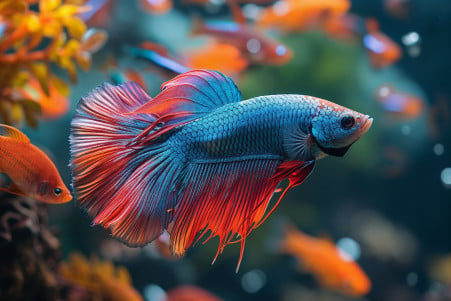Do Betta Fish Have Teeth? The Bite Behind Their Beauty
31 May 2024 • Updated 31 May 2024

You may have a beautiful betta fish swimming in your aquarium, but are these aggressive little fish hiding a set of pearly whites behind their full, luscious lips? Betta fish do have teeth, but they're not located in their mouths. Instead, bettas have pharyngeal jaws, which are teeth-like structures located in their throats. These pharyngeal jaws help bettas hold onto and tear their food, but their mouths are too small to do any damage in a fight.
This article will explore the biological and dietary factors that have led to the evolution of betta fish's pharyngeal jaws. By drawing on information from the fields of ichthyology and veterinary science, you'll come away with a better understanding of these brightly colored, but surprisingly aggressive, freshwater fish.
Do Betta Fish Have Teeth?
Anatomy and Structure of Betta Fish Teeth
Betta fish have approximately 50 teeth, which include sharp incisors for tearing and pharyngeal teeth in the throat for chewing and grinding. The teeth are small, pointed structures that are well-suited to the fish's carnivorous diet and hunting methods. The upturned jaw and strong bite of the betta enable it to effectively grab, tear, and pierce its prey.
Although small, the teeth are an important part of the betta's ability to catch and eat its prey. According to ichthyology insights, betta fish teeth develop from the embryonic stage through adulthood, and they become increasingly specialized to perform functions like grabbing, tearing, and piercing prey. This makes them a versatile tool that's well-suited to the betta's predatory nature.
Even though they are small, betta teeth are highly specialized and efficient hunting tools. Their sharp incisors enable bettas to grab and rip apart their prey, while the pharyngeal teeth chew and grind the prey into pieces that can be swallowed. This specialization is an important evolutionary adaptation that enables bettas to live as carnivores.
Teeth and Betta Fish Diet
Betta fish are carnivores and their teeth are used to catch, hold, kill, and chew their prey in the wild and in captivity. According to nicebettathailand.com, betta fish eat a diet of high-protein foods like pellets, bloodworms, brine shrimp, and small insects or larvae. Their teeth help them to better break down and digest their food, which can help them get more nutrients and be healthier overall.
As JV Betta points out, good dental health is important for betta fish to be able to eat and swallow their food properly. A healthy diet and proper feeding practices can help ensure that a betta's teeth stay in good shape. This includes feeding them a mix of high-quality betta fish pellets, freeze-dried/frozen foods, and the occasional live food treat, as noted by Bubble Fish Tank.
Betta Fish Teeth and Aggressive Behavior
Betta fish are infamous for their territorial and aggressive behavior, especially between males. As stated by bettafishlife.com, bettas have been observed to use their teeth to bite and shred the fins or tails of their rivals during fights or when they are trying to show dominance. This shows that their teeth are used as a defense mechanism and a way to show dominance over other bettas.
While betta bites are not dangerous to humans, as mentioned by FishLab, their teeth can be harmful to other fish in the tank. As pointed out by Freshwater Fish Forum, it is important to make sure that the tank is set up correctly and that aggressive bettas are separated to avoid biting injuries. Making sure that the fish are in a calm and appropriate environment can help to reduce the likelihood of aggressive behavior in these territorial fish.
Dental Care and Maintenance for Betta Fish
Good care and maintenance are important for keeping betta fish teeth healthy. According to JV Betta, making sure your fish gets a well-rounded diet that includes the right kinds of protein can help prevent dental problems and keep teeth healthy. Meanwhile, Bubble Fish Tank emphasizes the importance of keeping the water clean and watching for signs of dental issues, including mouth injuries and trouble eating.
In some cases, a vet may need to be consulted to treat a serious dental issue or injury. Meanwhile, the Freshwater Fish Disease and Health Forum says that keeping the tank clean and making sure there are no hard or sharp objects in the tank can help prevent a betta from breaking a tooth. With responsible tank maintenance, betta owners can ensure their fish's overall dental health and well-being.
Betta Fish Bites: Are They Safe?
Because betta fish do have teeth, they can bite. However, due to the small size of their teeth, bites from bettas are generally safe for humans. As FishLab explains, betta bites are unlikely to break the skin or cause any real pain, although the fish may exhibit nipping or biting behavior when they feel threatened or when they are breeding.
On the other hand, as the Freshwater Fish Forum points out, betta bites can be the most dangerous to other fish in the tank, especially during territorial disputes or fights. Still, as bettafishlife.com notes, proper handling and tank setup can help reduce the risk of betta bites and the injuries that can result for other fish or the betta.
Recognizing the limitations and potential dangers of betta bites is important for anyone who owns or manages an aquarium. However, by making safety a priority and ensuring the tank is set up properly, betta owners can appreciate these beautiful and interesting fish and their behaviors.
Conclusion: Understanding the Specialized Teeth of the Betta Fish
Betta fish, also known as Siamese Fighting Fish, have tiny teeth, but they do have teeth, and they can be seen if you look at the fish under a microscope or with a magnifying glass. The primary function of the betta fish's teeth is to break down large food items so that they can be more easily swallowed. While bettas are primarily carnivorous, they are also omnivorous and will eat some plant-based foods. In addition to biting, bettas use their teeth to chew and grind up algae, insects, and pellets so that they can be more easily digested.
Bettas have sharp teeth that they use to attack and remove the scales, fins, and tails of other fish. This is why it is not a good idea to keep two male bettas in the same tank, as they will fight and use their teeth to defend themselves. Bettas do not bite humans in an aggressive manner. If a betta fish bites a person, it is likely due to curiosity rather than aggression since bettas don't have hands and use their mouths to explore their environment. However, a betta's teeth are too small to break human skin, so any "bites" will be harmless.
Betta fish teeth are small but mighty, helping bettas capture prey more effectively. Their teeth are shaped like a cone to help them tear and break down their food efficiently. Teeth are used for grasping, tearing, and puncturing prey. The evolutionary adaptations of bettas' teeth help them succeed in their carnivorous diet and hunting behaviors. The sharp incisors of betta fish are essential for catching and tearing food.
To maintain the oral health and overall well-being of betta fish, it's important to practice good dental care. Important considerations include keeping the water in their tank clean, feeding them a balanced diet, and cleaning their tank's decorations. While betta fish can bite, their bites are unlikely to harm humans. You can help prevent aggressive behavior in betta fish by providing them with a calm, stress-free environment in their tank.


